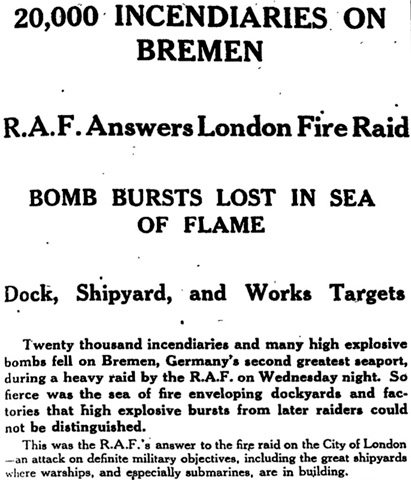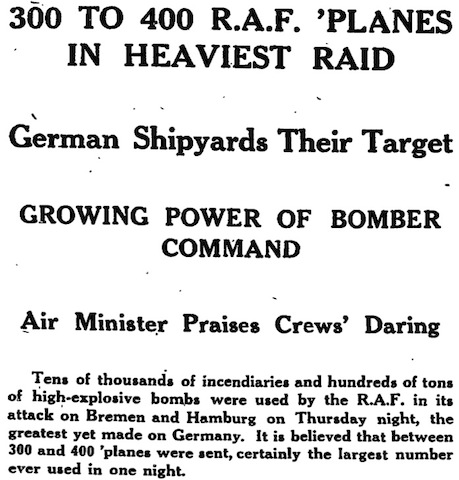
There have been alarming developments in the Near East, reports the Manchester Guardian today (5). Syria, a Vichy French possession, is being used as a staging post for German aeroplanes on their way to Iraq, where an anti-British coup recently took place.
About thirty have already crossed Syria, it is authoritatively stated in Cairo. Their markings are believed to be French. It is understood that the ‘planes are not troops-carriers but are transporting technicians.
According to the Associated Press most of the ‘planes landing in Syria are understood to be bombers.
The paper’s diplomatic correspondent says that
Germany is preparing to dominate Syria with a view to using it as a base for operations intended in the first instance to help Rashid Ali and the usurpers in Iraq who have made war on this country. At the same time Iran is being pressed to allow Germans to infiltrate there.
What isn’t mentioned here, but is clear from an accompanying map, is that Iraq and Iran have oil, which would be of great value to Germany, if it can eject Britain from the area. It does seem to be trying; although ‘The latest German “blitz” [into Egypt] seems to have gone off at half-cock’ (8), thanks to the RAF, reports in Istanbul (also under German pressure) suggest ‘the imminence of an attack on a big scale against Crete with combined operations by the Luftwaffe, Italian Navy, and land forces’ (5). Anthony Eden, the Foreign Secretary, has effectively given Vichy an ‘eleventh hour warning’ to ‘stop the Germans, but it is running out’. It seems unlikely that it will be effective. In what The Times describes as a ‘surrender by Pétain‘ (4), Vichy has
decided definitively on political agreement with Hitler, and henceforth the whole French political, economic, financial, and colonial policy will conform with that of the Axis. This includes the placing of the French African Empire at the disposal of the Axis for common development.
Hitler has apparently already demanded ‘as of right the abandonment by the French of the Cameroons, the occupation of which by the Germans would involve an open march across Morocco’.
The Hess affair is still attracting comment, again much of it of a contradictory nature. A leader in the Guardian says ‘its military significance is small’ (4):
It does not weaken German military power; it will not cause any slackening of German arms; if anything, it will only increase Nazi fanaticism.
By contrast, The Times‘s military correspondent is of the opinion that (4):
To have at our disposal in the midst of war not simply a man who knows a great deal but actually a man who knows everything about the enemy’s policy, plans, weaknesses, hopes, and fears is a unique experience […] It is the wildest dream of the intelligence services come true.
Berlin, of course, wants to downplay any such notion. The Guardian reports that German ‘officials’ yesterday claimed that ‘Military and diplomatic action of such magnitude can be expected in the near future that Hess will be completely eclipsed’ (8).
Readers of The Times don’t seem too impressed by Hess’s defection, or whatever it is (Churchill still hasn’t made his expected statement on the matter, although he did answer some questions in the House of Commons yesterday). Beatrice Brownrigg writes in to say (5):
From the tone of smug complacency in which the announcer of the B.B.C. gave out the news this morning, he must have thought it would bring infinite satisfaction to the suffering victims of the bloody savagery of the enemy, of which Rudolf Hess is one of the most guilty, to know that Rudolf Hess is “very comfortable.” Shall we next have our day made sweeter by being assured that, in spite of the treachery of his friend, Hitler has passed a good night!
Not there is much ‘bloody savagery’ to report in the way of air raids: ‘little damage and no casualties’ were reported yesterday (4). However some censorship restrictions on discussing previous air raid damage to London have been lifted. The Guardian‘s London correspondent (4):
the destruction by German raiders of more precious churches and Queen’s Hall — now indeed a ruined choir — and damage to St. James’s Palace and Lambeth Palace and the Old Bailey and Shaftesbury Theatre. St. Clement Danes, whose bells had rung out Oranges and Lemons ever since Covent Garden Market existed near by, was a Wren church with a Gibbs tower and one of the two island churches that formed the chief beauty of the Strand. Johnson worshipped there and his statue still stands with its back to its blackened apse. The Old Bailey has a huge rent in its façade and its library lies beneath tons of wreckage. Thousands of pounds’ worth of instruments belonging to the London Philharmonic Orchestra were destroyed at Queen’s Hall. At Lambeth Palace, too, many valuable books were destroyed and the Chapel roof was burned out.
The Times belatedly welcomes the centralisation of Britain’s fire-fighting services, which its leading article reports ‘has given wide satisfaction’ (5). But it wants more. It endorses an article by ‘a special correspondent’ which calls for more thoroughgoing centralisation of civil defences . The time has come, the correspondent writes, ‘for radical change’:
Air attack has come to stay. For months, years perhaps, we have to face the prospect for our cities of ordeal by fire and high explosive. The present writer has seen at close quarters the consequences of bombing in many of our large towns. The tragedy follows much the same lines whatever the locality: destruction of public buildings and commercial houses by fire and high explosive; shattering of private homes, temporary breakdown of communication by road, rail, telegraph, telephone; cutting off of gas, water, electricity. It is a pattern common to all.
Thus it is urgent ‘that the defensive machinery should be made at once more simple, flexible, and authoritative. The tangle of competing local bodies and their officials must be cut away and power concentrated on one responsible unit’, namely the Regional Commissioners who are to have great powers in the event of invasion. ‘But invasion tarries […] the situation in a bombed area brooks of no delay if human suffering is to be mitigated’.
![]() This work is licensed under a Creative Commons Attribution-NonCommercial-NoDerivatives 4.0 International License.
Permissions beyond the scope of this license may be available at http://airminded.org/copyright/.
This work is licensed under a Creative Commons Attribution-NonCommercial-NoDerivatives 4.0 International License.
Permissions beyond the scope of this license may be available at http://airminded.org/copyright/.




Have you seen this dodgy bit of gladwellizing about 1930s Airmindedness in Slate? Noel Pemberton Billing makes a cameo appearance! (And yes, that does appear to be a most un-Spitfirelike PBY Catalina in the illustration).
Pingback: Airminded · Saturday, 17 May 1941
Oh, so very dodgy. But what would I know, I don’t have a book-with-a-one-word-title-that-explains-nearly-everything to sell.
Pingback: Airminded · Post-blogging 1940: final thoughts and conclusions